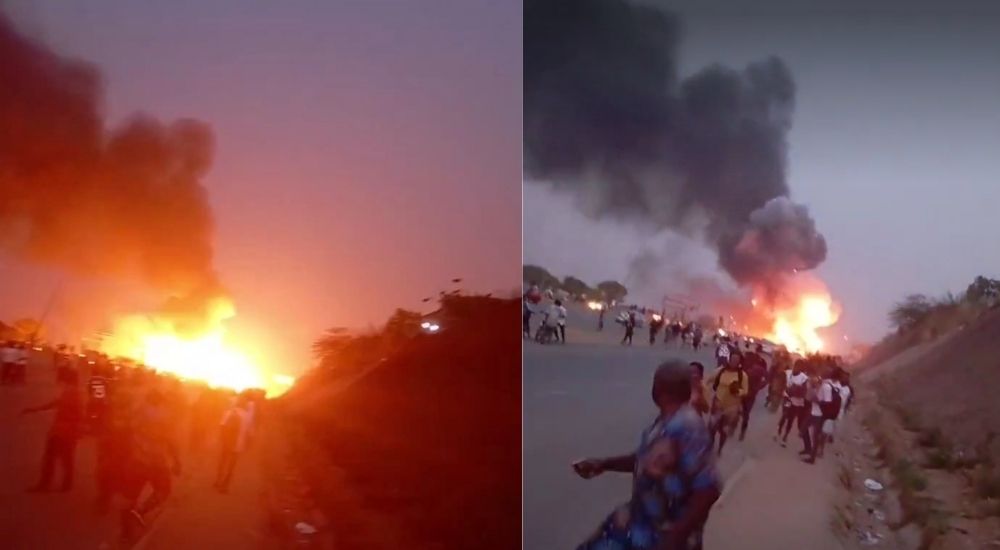Featured
Nigeria Diaspora Remittances Decline By 27.7% To $16.8bn, World Bank Confirms

Remittances by Nigerians in the Diaspora declined by 27.7 per cent in 2020, the World Bank has confirmed.
A report by the World Bank titled, ‘Defying Predictions, Remittance Flows Remain Strong During Covid-19 Crisis’, said Nigeria contributed 40 per cent of the remittances into Sub-Saharan Africa.
It put remittances to Sub-Saharan Africa at $42billion. Forty per cent contribution of Nigeria to this means that remittances to Nigeria was $16.8billion in 2020.
A decline of 27.7 per cent also put remittances into the country in 2019 at $21.45billion.
The report said remittances to Sub-Saharan Africa declined by an estimated 12.5 per cent due to a decline in the remittances to Nigeria that contributes the largest amount in the region.
Nigeria has been having foreign exchange crisis resulting from decline in earnings from crude oil sale.
Diaspora remittances are the second major source of foreign exchange for the country.
Drying forex remittances recently pushed the Central Bank of Nigeria (CBN) to offer an incentive of N5 for every dollar remitted through official channels.
Differing exchange rates often push Nigerians in the Diaspora to explore alternative ways of remitting money into the country so that they can enjoy higher value.
The report stated that the decline in flows to Sub-Saharan Africa was almost entirely due to a 27.7 per cent decline in remittance flows to Nigeria.
Excluding flows to Nigeria, it stated, remittances to Sub-Saharan Africa increased by 2.3 per cent, demonstrating resilience.
Part of the report read, “Remittances to Sub-Saharan Africa declined by an estimated 12.5 per cent in 2020 to $42billion.
“The decline was almost entirely due to a 27.7 per cent decline in remittance flows to Nigeria, which alone accounted for over 40 per cent of remittance flows to the region.
“Excluding Nigeria, remittance flows to Sub-Saharan African increased by 2.3 per cent.
“Remittance growth was reported in Zambia (37 per cent), Mozambique (16 per cent), Kenya (nine per cent) and Ghana (five per cent).”
The report said, in 2021, remittance flows to the region were projected to rise by 2.6 per cent, supported by improving prospects for growth in high-income countries.
Data on remittance flows to Sub-Saharan Africa were sparse and of uneven quality, with some countries still using the outdated fourth IMF balance of payments manual, rather than the sixth, while several other countries did not report data at all, it stated.
The World Bank said that high-frequency phone surveys in some countries reported decreases in remittances for a large percentage of households even while recorded remittances reported by official sources report increased in flows.
The shift from informal to formal channels due to the closure of borders explained in part the increase in the volume of remittances recorded by central banks, it stated.
On the remittance costs for Sub-Saharan Africa, the report said it remained the most expensive region to send money to, where sending $200 costs an average of 8.2 per cent in the fourth quarter of 2020.
“Within the region, which experiences high intra-regional migration, it is expensive to send money from South Africa to Botswana (19.6 per cent), Zimbabwe (14 per cent), and to Malawi (16 per cent),” it stated.
The report said the relatively strong performance of remittance flows during the Covid-19 crisis had also highlighted the importance of timely availability of data.
Given its growing significance as a source of external financing for low and middle-income countries, there was a need for better collection of data on remittances in terms of frequency, timely reporting, and granularity by corridor and channel.
It stated that the lead author of the report on ‘migration and remittances’ and Head of KNOMAD, Dilip Ratha, said, “The resilience of remittance flows is remarkable. Remittances are helping to meet families’ increased need for livelihood support.
“They can no longer be treated as small change. The World Bank has been monitoring migration and remittance flows for nearly two decades, and we are working with governments and partners to produce timely data and make remittance flows even more productive.”
Despite Covid-19, remittance flows remained resilient in 2020, registering a smaller decline than previously projected.
Officially, recorded remittance flows to low and middle-income countries reached $540billion in 2020, just 1.6 per cent below the 2019 total of $548billion, according to the latest migration and development brief, the World Bank stated.
It said that in spite of Covid-19, remittance flows remained resilient in 2020, registering a smaller decline than previously projected.
“The decline in recorded remittance flows in 2020 was smaller than the one during the 2009 global financial crisis at 4.8 per cent.
“It was also far lower than the fall in Foreign Direct Investment (FDI) flows to low-and middle-income countries, which, excluding flows to China, fell by over 30 per cent in 2020.
“As a result, remittance flows to low- and middle-income countries surpassed the sum of FDI of $259billion and overseas development assistance of $179billion in 2020.”
The brief said that the main drivers for the steady flow included fiscal stimulus that resulted in better-than-expected economic conditions in host countries and a shift in flows from cash to digital and from informal to formal channels.
It added that cyclical movements in oil prices and currency exchange rates were also responsible.
The ‘Migration and Development Brief’, released in Washington D.C., provides updates on global trends in migration and remittances.
Featured
Bring Your Wealth Of Experience To Governance, Ibas Tasks New SSG

The Sole Administrator of Rivers State, Vice Admiral Ibok Ete Ekwe Ibas (rtd), has charged the new Secretary to the State Government (SSG), Prof Ibibia Lucky Worika to bring his wealth of experience to bear in governance of the State.
Vice Admiral Ibas (rtd) gave the charge shortly after swearing in the new SSG at the executive chambers of Government House on Wednesday night.
The Administrator who congratulated Prof Worika on his appointment said the choice was not merely an administrative decision but a statement of intent.
Vice Admiral Ibas (rtd) explained that the new SSG has an unparallel expertise in law, policy and international governance, which align perfectly with the mission to restore law, order, integrity and public trust in Rivers State.
He said: “To our new SSG, the task ahead is onerous, but your track record leaves no doubt in our minds that you will prove your mettle. Rivers State needs your intellect, grit and unweaving dedication. Together, we will write a new chapter of progress for this great state.
“Prof Worika’s role will be critical in driving this vision, ensuring that every policy, every decision and every action is in consonance with this administration’s mandate to restore law and order, stabilize the polity and to create the necessary conditions for the restoration of democratic institutions and representations.”
Vice Admiral Ibas (rtd) pointed to his maiden address to Rivers people wherein he emphasised that his administration will be committed to delivering an effective governance that is anchored on transparency, accountability and service.
He therefore, enjoined the new SSG to brace up to the demands of his office, and offer his best service as required while also working cooperatively with civil servants.
Vice Admiral Ibas (rtd) said: “You have no time to settle down. You must roll up your sleeves and get to work with the team.
“Our civil servants with whom we will work closely to run this administration are critical stakeholders and we must work with them to ensure that the state continues to function effectively during this administration.
“To the Permanent Secretaries and civil servants as a whole, once more I will ask your kind cooperation and support as we work to achieve our objectives at this time,” he added.
Featured
I Am One Of You, Sole Administrator Tells Rivers People …Warns Against Violence, Crude Oil Sabotage

The Sole Administrator of Rivers State, Retired Vice Admiral Ibok-Ete Ibas (rtd), has assured residents that he is not in the State as a partisan actor or political competitor but as a stabilising force to restore governance and order.
In a state broadcast yesterday, Ibas, who assumed duty at Government House, Port Harcourt, emphasised his commitment to protecting civil liberties and ensuring the safety of all citizens.
However, he issued a stern warning against crude oil sabotage and violence, urging residents to resist any temptation to return to past hostilities.
“For decades, I have dedicated my life to the service of our great nation—first as the 20th indigenous Chief of Naval Staff and later as Nigeria’s High Commissioner to Ghana. I answered this call out of the need for peace in Nigeria, and most importantly, in Rivers State,” Ibas stated.
Describing the prolonged political impasse as a major setback to governance and democracy, he acknowledged the hardships faced by families and businesses due to the prevailing uncertainty.
“As a son of the Niger Delta, I am one of you. I feel the weight of this crisis on families, businesses, and the future of our people,” he said.
Ibas commended President Bola Tinubu’s decisive action in declaring a state of emergency in Rivers State, stressing that it was a necessary move to restore stability and revive economic activities.
“My mandate is clear: restore law and order, ensure stability, and create an enabling environment for economic growth. But this mission requires collective support from all stakeholders, regardless of political affiliation or ethnicity,” he stated.
He discouraged attacks on oil infrastructure, reminding residents of the devastating environmental and economic consequences of such actions.
“The Niger Delta has moved beyond the destruction of oil facilities. We must resist the temptation to return to those ugly days,” he cautioned.
While pledging to uphold civil liberties and the rule of law, the Sole Administrator warned that lawlessness and violence would not be tolerated.
“We will not act arbitrarily, but we will not hesitate to deal decisively with anyone who threatens the peace and stability of Rivers State,” he declared.
Ibas revealed that he had concluded a State Security Council meeting where strategic measures were outlined to de-escalate tensions and prevent further conflict.
Expressing gratitude to President Tinubu for entrusting him with the responsibility, he also acknowledged the National Assembly for approving the emergency declaration.
“I will work closely with the national leadership under the guidance of the President. I am optimistic that Rivers State will emerge stronger and greater,” he concluded.
Featured
Abuja Truck Explosion Death Toll Rises To 10 …As Another Truck Crashes On Same Spot

The Federal Capital Territory Emergency Management Department has confirmed that 10 persons have died in the truck explosion that occurred near Karu bridge, along the Abuja-Keffi Expressway, on Wednesday.
The FEMD’s Head of Public Affairs, Nkechi Isa, confirmed the numbers in a statement, yesterday.
The Acting Director General of the Emergency Department, Abdulrahman Mohammed, had earlier confirmed that eight persons had died as of yesterday morning, with five confirmed dead on the scene, and four others burnt beyond recognition.
““Five people were taken dead from the scene yesterday (Wednesday). Out of the people that were injured, one died, making six. Then this morning (yesterday), when I asked my people to go round, they discovered that two had already died again, making eight. Four of them from yesterday were burnt beyond recognition.”, he explained.
However, in her statement, Isa said the Head, Forecasting Response and Mitigation of FEMD, Mr Mark Nyam, said eight bodies were deposited at the Karu Hospital Morgue, one body at the Asokoro Distinct Hospital Morgue while another body was deposited at the National Hospital.
He added that some victims had been referred to the Gwagwalada Teaching Hospital, Federal Medical Centre, Keffi, and Cedercrest Hospital Abuja for proper care.
Part of the statement reads, “The FCT Emergency Management Department FEMD can confirm that 10 persons lost their lives to the truck explosion that occurred at Karu bridge along Abuja / Keffi expressway.
“The Head Forecasting Response and Mitigation of FEMD, Mr Mark Nyam said eight bodies were deposited at the Karu Hospital Morgue, one body at the Asokoro Distinct Hospital Morgue while another body was deposited at the National Hospital.”
He informed that over 30 persons suffered various degrees of burns.
“Some of the victims have been referred to Gwagwalada Teaching Hospital, Federal Medical Centre,Keffi and Cedercrest Hospital Abuja for proper care,” he said.
Isa also stated that no fewer than 10 vehicles were burnt during the incident, adding that the FEMD boss after a visit to the incident scene, appealed to motorists to observe traffic rules and regulations.
He also cautioned against reckless driving, dangerous overtaking and poor maintenance of vehicles, while urging FCT residents to always use the 112 emergency toll free number in the event of an emergency.
Meanwhile, barely 24 hours after the incident, another fertiliser-laden truck has collapsed on the same spot.
The Tide learnt that the incidence occurred at about 3:54pm yesterday.
The Head of Public Affairs of the FCT Emergency Management Department, Nkechi Isa, confirmed the accident in a statement, stating that the truck collided with a Hijet and a dump truck, adding that no life was lost.
She cautioned road users to drive with caution as the Federal Road Safety Corps was making efforts to tow away the affected vehicles, to avoid traffic built up.
“Another accident has occurred under Karu bridge along the Abuja-Keffi Expressway. Thankfully, no life was lost to the incident. Our Search and Rescue say the accident occurred when a truck laden with fertilizer ran into a Hijet and a dump truck also known as tipper.
“Motorists are advised to drive with caution as the Federal Road Safety Corps is taking steps to tow away the affected vehicles in order to avoid traffic built up,” the statement read.
Meanwhile, several videos showed some persons trying to clear the fertiliser bags from the fallen truck to ease traffic.













